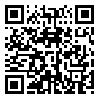BibTeX | RIS | EndNote | Medlars | ProCite | Reference Manager | RefWorks
Send citation to:
URL: http://pejouhesh.sbmu.ac.ir/article-1-1358-en.html

 , Mehrnaz Mesdaghi
, Mehrnaz Mesdaghi 
 , Zahra Chavoshzadeh
, Zahra Chavoshzadeh 
 , Parvaneh Karimzadeh
, Parvaneh Karimzadeh 
 , Mahboubeh Mansouri
, Mahboubeh Mansouri 
 , Reza Shekarriz
, Reza Shekarriz 

Background: Administration of phenytoin can been associated with severe adverse reactions such as hypersensitivity reactions. Lymphocyte transformation test (LTT) can be a useful method for determination of the drug, which has caused hypersensitivity reaction. This study was done to evaluate the results of lymphocyte transformation test in patients with delayed hypersensitivity reactions following phenytoin administration and control group.
Methods: In a case-control study, four patients with hypersensitivity reactions following administration of phenytoin and ten patients, who had used phenytoin without hypersensitivity reactions, were included. Peripheral blood mononuclear cells were isolated. The cells were stimulated with Phenytoin, PHA ( Phytohaemagglutinin ) as a mitogen and candida as an antigen. Lymphocyte proliferation was measured using Brdu proliferation assay kit (Roche, Germany). The stimulation index was calculated by dividing OD of stimulated to unstimulated cells. Stimulation index more than 2 were considered as positive. The results in case and control groups were compared, using Fisher's exact test.
Results: Of 4 patients in the test group,3 had positive LTT results and one had negative test result. Among patients in control group, none of them had positive LTT result. This difference was statistically significant (p=0.002). The mean time between development of drug reactions and perform the LTT was 16±6.9 months in the test group with positive result and 38 months in test group with negative test result. This difference was not statistically significant (p=0.174).
Discussion: .LTT can be a helpful method in diagnosis of the drug that has caused hypersensitivity reaction.
Received: 2015/01/14 | Accepted: 2015/11/28 | Published: 2016/03/6
| Rights and permissions | |
 |
This work is licensed under a Creative Commons Attribution-NonCommercial 4.0 International License. |




